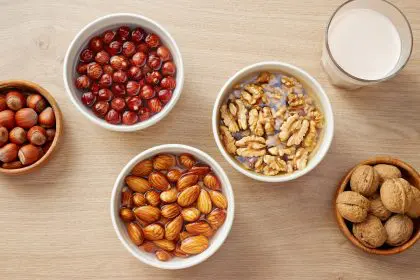What you believe protects your heart might actually be damaging it, according to those who understand cardiovascular health best.
The gap between marketing and medical reality
The grocery store aisles overflow with products boasting heart-healthy claims, colorful heart symbols, and promises of cardiovascular benefits. Yet many of these same products never make it into the shopping carts of the medical professionals who treat heart disease daily. This disconnect between marketing messages and medical practice reveals a troubling reality: many foods widely promoted as heart-healthy actually contribute to the very conditions cardiologists spend their careers treating.
The gap exists largely because food marketing operates under different standards than medical advice. Health claims on packaging require only limited scientific support and often highlight singular beneficial ingredients while ignoring problematic components. This selective presentation creates a distorted picture of many foods’ actual health impacts, particularly regarding cardiovascular health where the cumulative effect of dietary choices matters more than individual ingredients.
Even more concerning, some genuinely heart-damaging foods have successfully cultivated healthy reputations through strategic marketing, celebrity endorsements, and selective citation of research. These misleading characterizations persist despite mounting evidence of these foods’ harmful effects on important cardiovascular markers like inflammation, blood pressure, arterial function, and cholesterol profiles.
1. Vitamin-fortified breakfast cereals
Colorful cereal boxes prominently featuring heart-healthy claims represent one of the food industry’s most successful marketing achievements – and one of the greatest disconnects from cardiological reality. These products typically earn their heart-health credentials through added vitamins, minerals, and fiber while downplaying their substantial sugar content and refined carbohydrate base.
The cardiovascular impact of these cereals extends far beyond their vitamin content. The rapid glucose spike from their highly processed carbohydrates triggers substantial insulin release, promoting inflammation and triglyceride production – both significant factors in cardiovascular disease development. Many fortified cereals contain more sugar per serving than dessert products, yet maintain their health halo through strategic marketing of their vitamin content.
The artificial colors, preservatives, and other additives in many cereals create additional cardiovascular concerns. Research increasingly links these synthetic ingredients to increased oxidative stress and inflammatory processes that contribute to arterial damage over time. The vitamin fortification prominently advertised on packaging does little to offset these detrimental effects.
Most concerning from a cardiological perspective, these cereals often displace genuinely beneficial breakfast options. A morning meal of unprocessed whole grains, healthy proteins, and natural fiber sources would provide superior cardiovascular benefits without the metabolic disruption caused by heavily processed cereal products. This replacement effect may constitute these products’ greatest cardiovascular harm.
2. Vegetable oils marketed as heart-healthy alternatives
For decades, vegetable oils like corn, soybean, and canola have been promoted as heart-healthy alternatives to saturated fats. This recommendation stemmed primarily from these oils’ ability to lower LDL cholesterol levels in short-term studies. However, cardiovascular specialists increasingly recognize that this singular benefit comes with significant tradeoffs not reflected in these oils’ healthy reputation.
The processing required to produce these clear, shelf-stable oils involves extensive chemical treatments including bleaching, deodorizing, and high-heat methods that create problematic compounds. These processes substantially alter the oils’ molecular structure, creating trans fats and oxidized lipids with demonstrated negative cardiovascular effects. The resulting inflammatory impact often outweighs the cholesterol-lowering benefit highlighted in marketing materials.
The omega-6 fatty acid dominance in these oils creates another cardiovascular concern. While omega-6 fats are essential nutrients, the extreme imbalance between omega-6 and omega-3 fats in the modern diet promotes pro-inflammatory pathways. Most vegetable oils contain omega-6 to omega-3 ratios exceeding 10:1, far beyond the 4:1 ratio associated with reduced cardiovascular risk.
Perhaps most importantly, vegetable oils’ promotion as healthy cooking options encourages their use in high-heat applications like frying, where they become particularly damaging. When heated to common cooking temperatures, these polyunsaturated oils readily oxidize, forming compounds that directly damage arterial walls and promote atherosclerotic processes. This heating stability issue rarely appears in their marketing as heart-healthy options.
3. Low-fat flavored yogurt products
Yogurt’s natural probiotic content and potential benefits for gut health have helped establish its reputation as a nutritious choice. However, the low-fat flavored varieties dominating supermarket shelves bear little resemblance to traditional yogurt, particularly regarding cardiovascular impact. These products typically replace fat with substantial added sugars while retaining their healthy reputation.
The sugar content in many flavored yogurts exceeds that of dessert products, with some popular brands containing over 20 grams (5 teaspoons) per serving. This sugar load creates precisely the blood glucose and insulin fluctuations that contribute to metabolic syndrome – a primary risk factor for cardiovascular disease. The “low-fat” designation featured prominently on packaging diverts attention from this substantial sugar content.
The removal of natural milk fat eliminates beneficial fatty acids with demonstrated anti-inflammatory properties. Contrary to outdated assumptions, specific dairy fats appear to support cardiovascular health through complex mechanisms involving inflammation regulation and cell membrane function. Their removal from yogurt to achieve “low-fat” marketing claims may actually reduce the product’s heart health benefits.
The artificial flavors, colors, and thickeners added to compensate for fat removal create additional concerns. Some common additives like carrageenan have been linked to increased inflammation in sensitive individuals – a key factor in atherosclerosis development. These processing aids rarely appear prominently in marketing materials despite their potential cardiovascular impact.
4. Plant-based meat alternatives
The newest category of supposedly heart-healthy foods, plant-based meat alternatives, has gained extraordinary market presence through claims of cardiovascular superiority to animal products. While reducing red meat consumption benefits many people’s cardiovascular health, assuming these highly processed alternatives automatically offer improvement represents an oversimplification that cardiovascular specialists increasingly question.
The ingredient lists of leading plant-based meat products reveal extensive processing and numerous additives designed to mimic meat’s taste, texture, and appearance. This ultra-processed nature contradicts fundamental dietary principles for cardiovascular health, which consistently show benefits from minimally processed food consumption regardless of specific macronutrient composition.
The sodium content in many meat alternatives creates particular cardiovascular concern. Many products contain over 400mg of sodium per serving – a substantial portion of the daily limit for people with or at risk for hypertension. This sodium load directly impacts blood pressure regulation and vascular function, yet rarely receives attention amid broader health claims.
The oils used as fat sources in these products often include the same problematic vegetable oils cardiologists recommend limiting. Their presence in products marketed as heart-healthy further perpetuates confusion about these oils’ cardiovascular impact. The “plant-based” designation diverts attention from these products’ highly processed nature and questionable ingredient quality.
5. Grocery store smoothies and cold-pressed juices
The vibrant bottles of cold-pressed juices and smoothies occupying refrigerated grocery sections perfectly exemplify the disconnect between marketing and cardiovascular reality. These products prominently feature “natural” imagery and claims about antioxidant content and detoxification benefits while downplaying their concentrated sugar content and limited fiber.
From a cardiological perspective, the removal or destruction of fiber represents these products’ primary problem. Fiber serves crucial cardiovascular functions including cholesterol binding, blood glucose regulation, and microbiome support. Its removal in juicing or reduction in commercial smoothie processing eliminates the mechanism that would normally slow sugar absorption from whole fruits and vegetables.
The resulting rapid sugar absorption creates significant glucose and insulin spikes despite the products’ natural origins. For cardiovascular health, the metabolic impact of concentrated fruit sugars without fiber closely resembles that of other sugar-sweetened beverages, though the marketing messaging differs dramatically. The “cold-pressed” or “all-natural” designation doesn’t alter this fundamental metabolic reality.
The portion sizes of commercial products further compound this issue, with many bottles containing the extracted sugar from multiple whole fruits without their satiating fiber. This concentration effect creates a substantial carbohydrate load that would be difficult to consume in whole-food form, potentially contributing to weight management challenges that impact cardiovascular health.
6. Multi-grain and wheat breads with misleading labeling
Few food categories feature more heart-healthy claims with less substantiation than the bread aisle. Terms like “multi-grain,” “wheat,” and “stone-ground” create impressions of wholesomeness while often masking products nutritionally similar to white bread. The cardiovascular implications of these misleading labels are substantial given bread’s dietary prominence.
The critical distinction cardiovascular specialists emphasize is between whole grains and refined grains – a difference often deliberately obscured by clever marketing. Many “wheat” breads contain predominantly refined wheat flour with minimal whole grain content, despite packaging imagery suggesting otherwise. This refinement process removes the bran and germ components containing the very fiber, antioxidants, and micronutrients responsible for whole grains’ cardiovascular benefits.
Even breads advertising “made with whole grains” often contain more refined flour than whole grains, as marketing claims require only minimal whole grain content. These predominantly refined products create similar blood glucose responses to white bread despite their heathy-sounding names and packaging. This glycemic impact directly affects insulin levels, inflammation, and other key cardiovascular risk markers.
The addition of caramel coloring to simulate whole-grain appearance represents one of the industry’s most deceptive practices. This coloring creates the brown appearance consumers associate with whole grain products while adding potentially problematic chemical compounds. Reading ingredient lists remains essential for identifying truly whole-grain products beyond marketing terminology.
7. Enhanced waters and sports drinks with added nutrients
The beverage industry has masterfully created health halos around flavored water products through claims about electrolytes, vitamins, and other added nutrients. However, examining these products’ complete composition reveals why cardiovascular specialists typically avoid them despite their beneficial-sounding marketing.
The primary concern from a cardiovascular perspective involves these beverages’ sweetening agents. Many enhanced waters contain substantial added sugars despite their light, refreshing branding. Others utilize artificial sweeteners with potential metabolic effects still being researched. Either approach conditions consumers toward ever-sweeter flavor preferences that complicate heart-healthy dietary patterns.
The added vitamins and minerals featured prominently in marketing materials provide minimal cardiovascular benefit compared to obtaining these nutrients from whole foods. The isolated B vitamins, vitamin E, or other micronutrients added to enhanced waters lack the synergistic compounds found in natural food sources that appear responsible for many cardiovascular benefits in observational studies.
For active individuals, the electrolyte content promoted in sports drinks significantly exceeds requirements for all but the most extreme exercise circumstances. Routine consumption of these products by moderately active people provides unnecessary sodium – potentially problematic for those with hypertension risk – along with substantial sugar content that counteracts many exercise benefits for cardiovascular health.
What heart specialists actually eat instead
Rather than these marketed products, cardiovascular specialists typically gravitate toward naturally protective foods with substantial research supporting their benefits. Traditional Mediterranean diet components feature prominently in cardiologists’ personal eating patterns, including abundant olive oil, nuts, legumes, diverse vegetables, and moderate fruit consumption.
For breakfast, heart specialists typically choose unprocessed alternatives to sugary cereals. Steel-cut oats with nuts and berries, egg-based meals with vegetables, or plain yogurt with whole fruit provide sustained energy without the metabolic disruption caused by heavily sweetened breakfast products. These choices support stable blood glucose levels throughout the morning while providing genuine nutritional value.
Instead of processed vegetable oils, cardiovascular experts typically use olive oil, avocado oil, and sometimes coconut oil depending on the application. These minimally processed options maintain their natural compound profile and demonstrate greater stability under cooking conditions. Their diverse fatty acid profiles and natural antioxidant content support cardiovascular function through multiple mechanisms beyond simplecholesterol effects.
Rather than commercial plant-based meat products, cardiologists more typically include naturally plant-forward options like legumes, traditional tofu, tempeh, and abundant vegetables. These minimally processed plant foods provide cardiovascular benefits without the questionable additives and excessive sodium found in highly processed alternatives.
The psychology behind health halos
Understanding why intelligent, health-conscious consumers continue purchasing cardiovascular-damaging foods despite contradictory evidence provides important insights. The psychology of health halos explains much of this disconnect between marketing impression and nutritional reality.
The brain processes health claims through emotional rather than analytical pathways, creating positive associations that override more detailed nutritional evaluation. A product featuring a prominent heart-healthy claim activates positive emotions that influence purchasing decisions more strongly than rational analysis of the complete nutritional profile would. This emotional processing explains why even nutritionally knowledgeable consumers sometimes make contradictory choices.
Decision fatigue further compounds this vulnerability to misleading health claims. Grocery shopping involves hundreds of small decisions in a stimulation-rich environment, gradually depleting cognitive resources for careful evaluation. As decision-making becomes increasingly taxing, shoppers rely more heavily on shortcuts like front-of-package claims rather than detailed nutritional analysis.
The authority bias inherent in official-looking symbols and certifications creates additional persuasive power. Heart-check marks and similar endorsements leverage this psychological tendency to trust authoritative-seeming information, even when the certification criteria may have little relationship to comprehensive cardiovascular health.
Breaking free from misleading marketing
Developing genuine cardiovascular nutrition literacy requires strategies that counteract these powerful marketing influences. Several practical approaches help distinguish truly heart-protective foods from those with merely effective marketing.
Adopting a primarily perimeter-shopping pattern naturally avoids many problematically marketed products, as minimally processed foods typically occupy store perimeters while heavily marketed packaged products dominate center aisles. This shopping pattern aligns closely with cardiologists’ personal food choices while simplifying decision-making in the challenging grocery environment.
Learning to evaluate ingredients rather than claims represents another crucial skill. Front-of-package claims receive minimal regulatory oversight compared to the ingredient list and nutrition facts panel. Prioritizing whole-food ingredients while minimizing added sugars, processed oils, and extensive additive lists naturally leads toward more cardiovascular-protective choices regardless of marketing claims.
The degree of processing provides another useful evaluation metric beyond specific ingredients. Foods undergoing extensive processing generally demonstrate less cardiovascular benefit regardless of their specific macronutrient composition or fortification. Choosing foods in forms recognizable to previous generations – rather than recently developed highly processed alternatives – typically leads toward improved cardiovascular outcomes.
Perhaps most importantly, understanding personal health metrics provides objective feedback about dietary patterns beyond marketing influences. Regular lipid panels including advanced measures like apolipoprotein B and inflammation markers like high-sensitivity C-reactive protein offer insights into how food choices affect individual cardiovascular status beyond generic population-level claims.
The future of truly heart-healthy eating
The evolving understanding of cardiovascular nutrition continues moving away from the oversimplified models that enabled misleading marketing claims. Newer research emphasizes food processing methods, inflammatory impacts, and metabolic effects beyond traditional lipid measures. This comprehensive approach makes misleading marketing increasingly difficult as consumers become more sophisticated in their nutritional understanding.
The growing recognition of individual variation in dietary responses further complicates simplistic health claims. Emerging evidence suggests genetic differences, microbiome composition, and metabolic factors significantly influence how individuals respond to specific foods. This personalization undermines one-size-fits-all health claims while emphasizing the importance of objective personal health markers as feedback.
The shift toward whole-food dietary patterns rather than individual nutrient-focused recommendations also helps counteract misleading marketing. Evaluating foods within their overall dietary context rather than for isolated beneficial ingredients naturally favors minimally processed options over cleverly formulated products designed specifically to make health claims.
As these scientific understandings advance, truly cardiovascular-protective eating continues returning to patterns recognizable to previous generations – abundant plant foods, minimally processed animal products when consumed, traditional preparation methods, and limited refined carbohydrates. This approach, though less marketable than novel engineered products with specific health claims, consistently demonstrates superior outcomes for the cardiovascular measures that ultimately matter most.
















